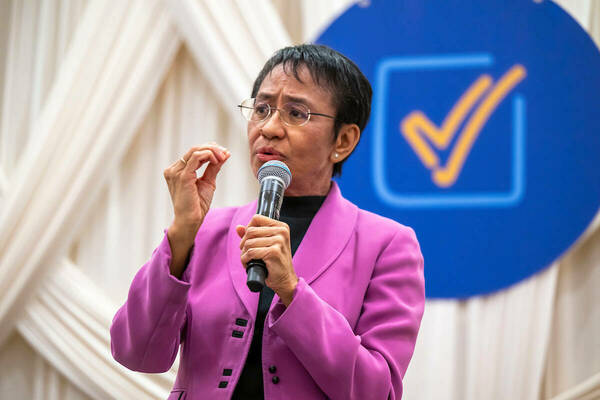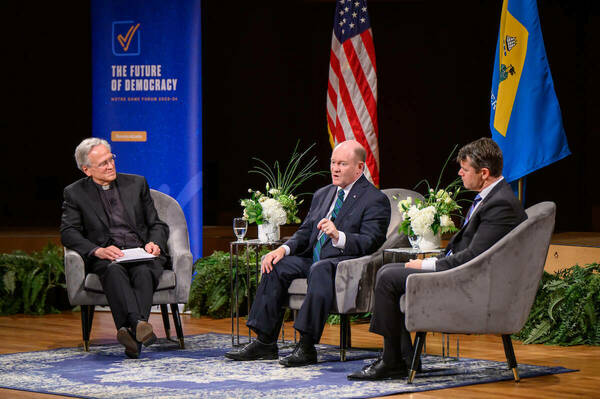Notre Dame launches University-wide Democracy Initiative to advance research, education and policy efforts to sustain and enhance democracy
The University of Notre Dame has launched an ambitious new Democracy Initiative, an interdisciplinary research, education and policy effort focused on advancing solutions to sustain and strengthen global democracy.
Democracy is in crisis at home and abroad. Polarization is high, trust is low and public discourse is toxic. The level of democracy experienced by the average person in the world today has regressed to the level of 1985, and more than 70 percent of the global population currently lives under autocracy, according to a 2024 report by the Varieties of Democracy Project.
“Notre Dame will leverage its position as a leading global Catholic research university to play a key role in responding to this crisis,” said University President Rev. John I. Jenkins, C.S.C. “We will do all we can as scholars, teachers and leaders to reverse these troubling trends and preserve democracy for generations to come.”

Father Jenkins designated “The Future of Democracy” as the theme for the 2023-24 Notre Dame Forum, bringing to campus national and international experts who were featured in University-wide keynote events. The Notre Dame Democracy Initiative builds on those important conversations.
Emerging from the University’s strategic framework and led by political scientist David Campbell, the initiative will incubate and accelerate research on the health of democracy in the U.S. and worldwide, serve as a convenor for conversations about and actions to preserve democracy, and foster a model for the formation of civically engaged citizens and public servants.
“Notre Dame can — indeed must — be a global catalyst for strengthening faith in democracy,” said Campbell, the Packey J. Dee Professor of American Democracy.
The University is already a leader in two key areas of the study of democracy in the Department of Political Science, with a strong cohort of scholars of American government in the Rooney Center for the Study of American Democracy and a long legacy of the study of global democracy, especially in Latin America, in the Kellogg Institute for International Studies, which is part of Keough School of Global Affairs. American attitudes toward democratic principles are regularly assessed through the Rooney Center’s Health of Democracy Survey, and Notre Dame political scientist Michael Coppedge has been a key contributor to the Varieties of Democracy Project, an annual assessment of the state of democracy across the world led by an international group of scholars.
Notre Dame’s new initiative seeks to foster deeper and more impactful collaboration between scholars of U.S. and global democracy in these and other Notre Dame centers, institutes and programs, while also providing support for democracy-related research in a wide range of disciplines, from history to law to computer science. This will include interconnected research clusters focused on democratic institutions, democratic culture, and religion and democracy.
While the state of U.S. democracy appears to be on a dangerous precipice, Campbell said, it has weathered similar crises in the past thanks to scholar-driven democratic innovations that are now taken for granted. Ensuring the preservation of American government — and democracy around the world — demands that bright minds come together again to propose innovative solutions to pressing problems.
“Republicans and Democrats agree that there is something wrong with American democracy, and the simple recognition of a problem is the starting point,” Campbell said. “If things are going to change, it will require institutions like the University of Notre Dame to bring brilliant people together to figure out what to do differently.”

The Notre Dame Democracy Initiative will direct its work toward three areas:
-
Research: The initiative will support scholarship that proposes solutions to democracy’s biggest challenges, not just by political scientists but by researchers from across the disciplines. It will have a focused interest in developing projects that identify and propose solutions that can be translated to policymakers and the general public.
-
Education: By creating and enhancing curricular and co-curricular opportunities in South Bend and in Washington, D.C., the initiative will develop Notre Dame undergraduates, graduate students and postdocs into the next generation of principled civic leaders.
-
Convening: The initiative will serve as a platform through which the University hosts high-profile events with key figures in the fight to preserve and advance democracy, while also bringing together elected officials and policymakers from across the political spectrum to learn from the research done at Notre Dame. The Kellogg Institute’s Global Democracy Conference, being held on campus May 20–22, and the Rooney Center for the Study of American Democracy’s Keeping the Republic Conference on May 8 are prime examples of the role Notre Dame can play in facilitating and advancing vital conversations among scholars, policymakers and practitioners focused on key questions related to democracy.
“Notre Dame’s Catholic mission, with its ethical commitments rooted in faith that do not neatly align with any one party, gives us a unique platform to credibly engage voices and reach citizens across the political spectrum — a rare prospect in this bitterly divided era,” said John T. McGreevy, the Charles and Jill Fischer Provost. “We are prepared to take on the great responsibility of filling a critical gap in the current political conversation and sharing innovative insights from our research in order to explore how we can work together to strengthen democracy.”
For more information about the Democracy Initiative, visit go.nd.edu/democracy.
Latest University News
- Notre Dame elects two new TrusteesTwo new Trustees — John F. Crowley and Danielle Walker Merfeld — have been elected to serve on the University of Notre Dame’s Board of Trustees effective July 1. …
- Alumni Association awards 2025 Lennon Life PrizesThe Notre Dame Alumni Association recognized nine alumni clubs as recipients of the Lennon Life Prize — part of the Chuck and Joan Lennon Gospel of Life Initiative, a set of programs focused on encouraging the University’s dedicated network of clubs to uphold the value of life at all stages.
- Jenkins Center for Virtue Ethics receives grant to advance love-based ethical frameworkThe University of Notre Dame has received a $10 million grant from the John Templeton Foundation to support a project titled Love and Social Transformation: Empowering Scholars and Social Innovators to Develop the Love Ethic.
- Notre Dame honors Carmi and Chris Murphy with 2025 Sorin AwardIn recognition of their contributions to the University of Notre Dame and service to the South Bend community, Carmi and Chris Murphy were presented with the 2025 Rev. Edward Frederick Sorin, C.S.C., Award on May 31 at the Alumni Association’s annual reunion celebration.
- In Memoriam: Sriram SomanchiSomanchi was a widely respected teacher and scholar whose research broke new ground in the academic landscape by drawing on social science and statistical machine learning to develop and deploy methods that bridge these related but distinct disciplines.
- Notre Dame announces next step for emerging tech and talent district in downtown South BendThe Tech and Talent District, a keystone of the city of South Bend’s Downtown South Bend 2045 plan, has advanced a step closer to implementation via a partnership between the University of Notre Dame and Ancora to pursue the development of the first phase of the district.












